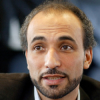Tariq Ramadan

Tariq Ramadan
Tariq Ramadanis a Swiss academic, philosopher and writer. He is the professor of Contemporary Islamic Studies in the Faculty of Oriental Studies at St Antony's College, Oxford and also teaches at the Oxford Faculty of Theology. He is a visiting professor at the Faculty of Islamic Studies, the Université Mundiapolisand several other universities around world. He is also a senior research fellow at Doshisha University. He is the director of the Research Centre of Islamic Legislation and Ethics, based in...
NationalitySwiss
ProfessionWriter
Date of Birth26 August 1962
CountrySwitzerland
Because ethics is fundamentally about questioning the ends, the goals and aims of our actions, we must come back to the rules and ask why. So we must return to the philosophy of law, the raison d'etre and the point of what we're asked to do. It's not easy, it's very demanding and it needs intellectual courage.
Emancipation can only come from within; it cannot be dictated by someone else. A law banning the wearing of headscarves changes nothing, except perhaps external appearance. Naturally, Islamic feminism must also include the right to education, to work and the freedom to select one's own husband.
51% of the French people - who are not very religious - were thinking that what "Charlie Hebdo" did was unwise. They aren't asking for a law to prevent Charlie Hebdo from publishing caricatures, but they are calling on its editors to be a bit more sensible.
We are not here to adopt Western values, we are here to colonize the U.S. (and Canada) and spread Islamic sharia law Canada has one of the easiest legal systems to penetrate and advance sharia from within...but if that doesn't work, we won't hesitate to use violent jihad.
I wrote a call to the contemporary Muslim conscience, saying to the ordinary people that we might not like the video or the cartoons, but that violence certainly isn't the right answer. I don't think laws are going to solve the problem.
Freedom of expression is not absolute. Countries have laws that define the framework for exercising this right and which, for instance, condemn racist language.
It's clear there is nothing in my record supporting terrorism.
We all cherish freedom of speech, but with a reasonable approach and a reasonable use of it. If we come to this, it is a debate. If not, then it is a power struggle. Who is going to win, the Muslim principles or the Western principles?
I've never suffered because of my heritage in Europe.
Many U.S. organizations believe that I am being barred from the country not because of my actions but because of my ideas. The conclusion seems inescapable.
We've got to get away from the idea that scholars in the Islamic world can do our thinking for us. We need to start thinking for ourselves.
The rich stick together; the poor and the marginalised are thrown together.
The world is a complex place, and the influence of the media in its representation and its power of communication and interpretation is a remarkable amplifier of emotions, and of illusions.
Cultures, along with the religions that shape and nurture them, are value systems, sets of traditions and habits clustered around one or several languages, producing meaning: for the self, for the here and now, for the community, for life.